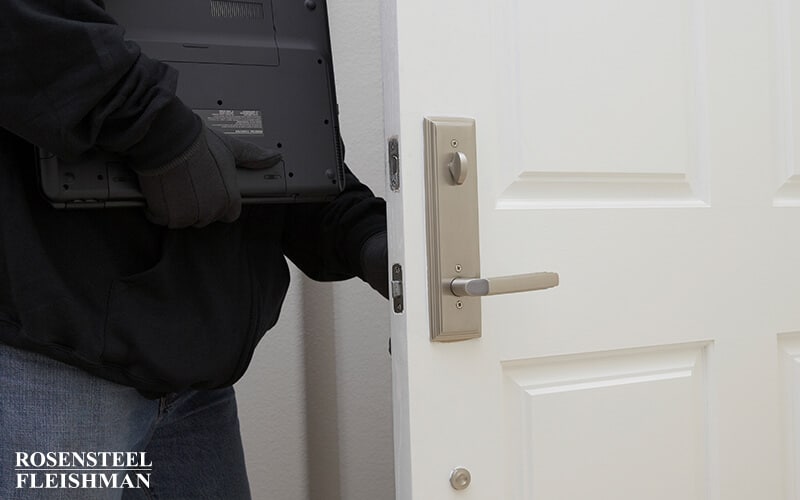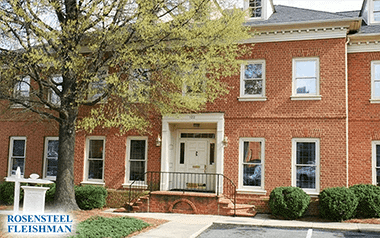Criminal Defense Lawyer for Burglary Charges

Burglary in North Carolina is a serious crime and is punishable by months or years in prison. If you are facing a charge of burglary, an experienced defense lawyer will know how the law applies to the facts of your case and can work to potentially reduce or dismiss your charges. Call Mr. Rosensteel so that he can determine the best course of action for you.
North Carolina Burglary Definition
Burglary was historically defined as the breaking and entering of the dwelling house of another at night for the purpose of committing a crime.
Burglary was historically defined as the breaking and entering of the dwelling house of another at night for the purpose of committing a crime. Most states have broadened the definition of burglary to include the breaking and entering into structures other than a dwelling house and during times other than at night, but North Carolina law maintains the historical definition of burglary. North Carolina law breaks the crime of burglary into two degrees – first degree burglary and second degree burglary. If the burglary is committed when the dwelling house is occupied, the crime is first degree burglary. If the dwelling house or sleeping apartment is not occupied when the burglary is committed, the crime is second degree burglary.
Learn more about Breaking or Entering Offenses
First Degree Burglary
To prove the crime of first degree burglary, the following elements must be shown:
- the defendant broke and entered a dwelling house or sleeping apartment
- the breaking and entering was during the nighttime
- at the time of the breaking and entering the dwelling house or sleeping apartment was occupied
- the owner or tenant did not consent to the breaking and entering
- at the time of the breaking and entering the defendant intended to commit a felony within the dwelling house or sleeping apartment
A person who commits first degree burglary is guilty of a Class D felony. North Carolina law provides that a person who commits a Class D felony must receive a sentence between 38 and 160 months of active jail time, depending on the person’s prior convictions.
Second Degree Burglary
To prove the crime of second degree burglary, the following elements must be shown:
- the defendant broke and entered a dwelling house or sleeping apartment
- the breaking and entering was during the nighttime
- the owner or tenant did not consent to the breaking and entering
- at the time of the breaking and entering the defendant intended to commit a felony within the dwelling house or sleeping apartment
A person who commits first degree burglary is guilty of a Class G felony. North Carolina law provides that a person who commits a Class G felony must receive a sentence between 8 and 31 months, depending on the person’s prior convictions. A person with no prior convictions may receive an intermediate punishment, but the court is permitted to sentence any person convicted of a Class G felony to active jail time.
Breaking
A person enters the dwelling house or sleeping apartment when any portion of his body or any implement under his control enters into the premises. However, the implement under his control which enters into the premises must be a type of tool which the person intends to use to commit the felony in order to constitute an entry. If a person breaks a window and then inserts a hook through the broken window to grab an item inside, this would constitute an entry. However, if a person used a shotgun to break the window and the end of the shotgun went through the window during this act, the shotgun through the window would not constitute an entry.
Dwelling House
A dwelling house is a house in which someone lives. North Carolina courts have held that where there are more than one buildings on a property, the dwelling house includes not just the main house in which the owner or tenant might live or sleep, but also all others houses within the curtilage of the house, such as a smokehouse or an outhouse. The curtilage of the house is the land around it on which such outbuildings lie which are “commonly used within the dwelling house.”
Nighttime
Nighttime is defined as the time “when it is so dark that a person’s face cannot be identified except by artificial light or moonlight.” The nighttime element might be shown by fitting a time period of the crime into the period between the recorded sunset and the recorded sunrise. Alternatively, a person present at the scene at the time of the burglary or shortly thereafter might be able to testify to the darkness.
Intent to Commit Felony
A person guilty of burglary must have the intent to commit a felony at the time of the breaking and entering. A common intended felony during a burglary is larceny, which is the taking away of property of another with the intent to permanently deprive the owner of the property. Larceny can be a misdemeanor, depending on the value of the property. However, the North Carolina burglary statute provides that “[f]or the purposes of defining the crime of burglary, larceny shall be deemed a felony without regard to the value of the property in question.”
How is intent shown? A person’s intent to commit larceny can be shown through evidence of items that have gone missing after a breaking or entering. In addition, if there is no other evidence of the person’s intent or any explanation for his breaking and entering at night, a jury may infer that the person intended to steal.
Speak to a Charlotte, NC Lawyer about your Burglary Case Today
Burglary is a serious criminal offense that can carry severe consequences, including imprisonment and fines. The experienced criminal defense lawyers at Rosensteel Fleishman Car Accident & Injury Lawyers understand the seriousness of a burglary charge and are dedicated to fighting for the rights of their clients. With a thorough understanding of North Carolina criminal law, they are able to provide knowledgeable and effective legal representation to those who have been charged with this crime.
At Rosensteel Fleishman, the team takes an individualized approach to every case, recognizing that each situation is unique and demands a tailored legal strategy. With a strong focus on client satisfaction, they work diligently to protect their clients' rights and pursue outcomes that align with their specific goals and circumstances.
If you have been charged with burglary, do not wait to seek legal representation. Contact Rosensteel Fleishman (704) 714-1450 today to schedule a free initial consultation and discuss your options.

